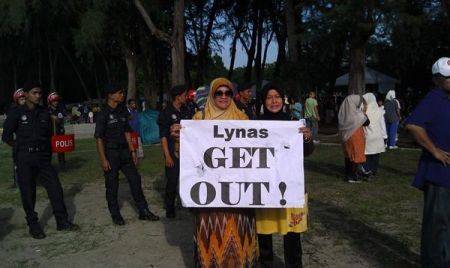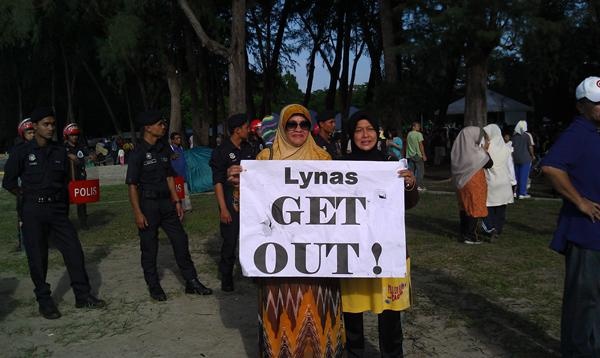The New York Times on 21 March 2012 continued its coverage of the Lynas Advanced Materials Plant in Gebeng, Kuantan. The article, which is reproduced below from the original web edition found here, quotes LoyarBurokker Shanmuga K. A version of the article also appeared in print on March 22, 2012, on page B3 of the New York edition with the headline: Challenges To Prospects For a Plant In Malaysia.
Political and Construction Hurdles for Malaysia Rare Earths Plant
By LIZ GOOCH and KEITH BRADSHER
KUALA LUMPUR, Malaysia — A controversial rare earth metal refinery in Malaysia encountered further obstacles this week, with the country’s political opposition refusing to participate in a parliamentary committee set up to investigate the safety of the plant and with hints that the refinery could face further construction delays.
The plant, which is being built by the Australian company Lynas, is one of two giant projects intended to break China’s near-monopoly on the production of rare earths; the other is in the California desert near Death Valley. But the Malaysian project, on the outskirts of Kuantan, one of the country’s largest cities, has become a lightning rod for activists and residents concerned about possible radiation leaks.
Rare earths are used for a wide range of high-technology products, including smartphones, smart bombs and electric cars. They are found in nature with radioactive contaminants that must be separated and disposed of during refining.
Lynas says that its ore, mined in the Australian desert, has a lower concentration of these contaminants than many rare earth deposits elsewhere.
The refinery has received a temporary operating license from the Malaysian government, but the project has already had a series of delays and protests. Last month, demonstrations in Kuantan and at least three other cities around the country, including Kuala Lumpur, attracted thousands of protesters.

The Kuala Lumpur High Court on Tuesday directed Malaysia’s Atomic Energy Licensing Board to provide details of the temporary license that it gave Lynas. The court acted after a group of residents near the refinery filed an application for a judicial review of the license, said K. Shanmuga, one of the group’s lawyers.
Lynas originally planned to finish the factory by last September, despite warnings by engineers that it would not be ready then. But the company ran into delays and ended up announcing in the fall that the project would not be finished until the second quarter of this year.
An engineer with a detailed knowledge of the project said Wednesday that another delay had come up in recent days. Complex electronic components that require a long time to manufacture were ordered late and will not be ready for the first phase of the refinery’s construction until November, said the engineer, who requested anonymity to avoid retaliation by Lynas in the close-knit mineral processing industry.
Parts of the refinery can be commissioned without the components, including kilns for drying ore, the engineer said, but other sections of the production process require the components.
Lynas denied that it was facing further construction delays, saying in a statement that any parts arriving late this year would be for either a spare parts inventory or a planned second phase that would double the capacity of the refinery.
“Attempts to characterize it otherwise are either misinformed or a deliberate distortion,” the company said.
The engineer disagreed, insisting that the parts were needed for the first phase.
The United States, the European Union and Japan filed a complaint with the World Trade Organization last week against China, accusing it of violating free trade rules with its quotas and taxes on rare earth exports. Japan announced Wednesday that Steven Chu, energy secretary of the United States, would join senior European and Japanese officials for talks in Tokyo next Wednesday on ways to recycle rare earths or develop alternative supplies.

Attempts by Lynas to reassure the public that the plant is safe have failed to satisfy activists and opposition parties.
The Malaysian government announced Saturday that it would establish a bipartisan parliamentary committee to investigate public concerns about the safety of the plant. Critics assailed the move as a public relations exercise in advance of elections widely expected to be held later this year.
The committee was to include four members from the governing coalition, three from the opposition and one independent member. But on Tuesday, the opposition announced that it would boycott the panel.
Fuziah Salleh, the opposition member of Parliament for Kuantan who has been a leader of the protest movement, said the opposition had decided not to take part in the committee because the government was using the panel to try to quell public worries. She contended that the government would allow the plant to go ahead regardless of the committee’s findings.
Prime Minister Najib Razak has said that the committee was being set up to engage with the public but that it would not decide the fate of the project, according to a report Saturday by the national news agency Bernama.
“It’s a fait accompli right from the beginning,” Ms. Fuziah said.
She said the opposition had requested a number of conditions, like a stop-work order on the plant while the committee’s investigation took place and a revocation of Lynas’s temporary license until the committee had issued its findings. But she said the government had refused to accept the opposition’s requests.
“We made it clear that for the committee to be effective, the select committee should be given the mandate to decide on the safety and what is the final outcome,” she said. “However, the government side is only keen to use the select committee as a public relations tool to engage with the public to allay the fear and concerns regarding the safety.”
Ms. Fuziah said she had been hopeful that the opposition could participate in the committee, but “finally we decided that it would be a waste of time because they have already decided,” she said.
According to the Bernama report, Mr. Najib said he hoped the committee could raise awareness of the project so that “we can achieve comfort in terms of better public acceptance.”
Khaled Nordin, the minister of higher education and the head of the committee, said Wednesday that Parliament had approved the establishment of the committee and that he expected the names of the committee members to be announced Thursday.
He said the opposition’s decision not to participate in the committee was “political.”
James Chin, a political scientist and the director of the School of Arts and Social Sciences at Monash University in Malaysia, said that under the rules of Parliament, the government could still proceed with the panel even if the opposition refused to take part.
Mr. Chin said that the safety of the plant could become a concern for more voters but that for now it was mainly an issue for people who lived near the refinery.
“For the other members of the general public, it’s not really a big issue yet,” he said. “It has the potential of becoming a really big issue, so it depends on how the government handles it.”
Ms. Fuziah said another rally was planned for next month.
Liz Gooch reported from Kuala Lumpur, and Keith Bradsher from Hong Kong.

